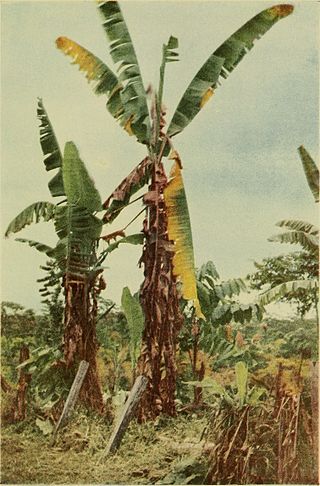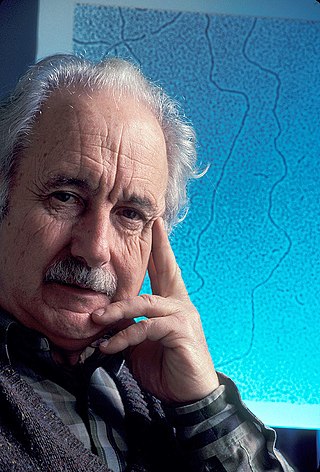
Plant pathology or phytopathology is the scientific study of plant diseases caused by pathogens and environmental conditions. Plant pathology involves the study of pathogen identification, disease etiology, disease cycles, economic impact, plant disease epidemiology, plant disease resistance, how plant diseases affect humans and animals, pathosystem genetics, and management of plant diseases.

Panama disease is a plant disease that infects banana plants. It is a wilting disease caused by the fungus Fusarium oxysporum f. sp. cubense (Foc). The pathogen is resistant to fungicides and its control is limited to phytosanitary measures.

Theodor Otto Diener was a Swiss-American plant pathologist. In 1971, he discovered that the causative agent of the potato spindle tuber disease is not a virus, but a novel agent, which consists solely of a short strand of single-stranded RNA without a protein capsid, eighty times smaller than the smallest viruses. He proposed to name it, and similar agents yet to be discovered, viroids. Viroids displaced viruses as the smallest known infectious agents.

Frances Meehan Latterell was an American plant pathologist whose research in the late 1940s opened a major new area of inquiry into the physiological basis of plant disease. She was the senior author on a classic 1947 paper showing that the toxin victorin, produced by the pathogenic fungus Helminthosporium victoriae, caused symptoms of Victoria blight of oats, a new disease first described by Latterell and her major professor in 1946. This discovery of a host-specific toxin, as victorin was later named, gave scores of subsequent researchers new model systems for studying plant disease.

Fusarium oxysporum f. sp. cubense is a fungal plant pathogen that causes Panama disease of banana, also known as Fusarium wilt. The fungi and the related disease are responsible for widespread pressure on banana growing regions, destroying the economic viability of several commercially important banana varieties.
Ruth Florence Allen (1879–1963) was an American botanist and plant pathologist and the first woman to earn her Ph.D. in botany from the University of Wisconsin. Her doctorate research focused on the reproduction and cell biology of ferns, particularly the phenomenon of apogamy. Later in her career, Allen shifted her focus to plant pathology. Her major contribution to the field of mycology was furthering the understanding of rust fungi, a group of economically important plant pathogens. Allen completed many studies on Puccinia graminis, once considered a catastrophically damaging disease-causing agent in cereal crops before the discovery of current management measures.
Ronald Karslake Starr Wood, was a pioneer British plant pathologist, and Professor of Plant Pathology at Imperial College London. He was the first academic to be appointed chair in physiological plant pathology in England and Wales. He was also the first president of the British Society for Plant Pathology and the first president of the International Society for Plant Pathology.
George Henry Hepting was an American forest scientist and plant pathologist. Hepting was Chief Plant Pathologist at Southeastern Forest Experiment Station of US Forest Service and a member of the National Academy of Sciences. He has been called a "pioneer leader in forest pathology".

Niklaus J. Grünwald is a biologist and plant pathologist born and raised in Caracas, Venezuela of German and Swiss ancestry. He is currently a research scientist with the USDA Agricultural Research Service, a Professor (Courtesy) in the Department of Botany and Plant Pathology at Oregon State University, and a Professor (Adjunct) in the Department of Plant Pathology and Plant-Microbe Biology at Cornell University.
Frank Leslie Howard was a prominent American mycologist.

Noel Thomas Keen was an American plant physiologist. He spent his career teaching at University of California, Riverside (UCR). His research focused on the varied ability of cultivars to detect and resist pathogens.

Charlotte Elliott (1883-1974) was a pioneering American plant physiologist specializing in bacterial organisms that cause disease in crops who was the author of a much-used reference work, the Manual of Bacterial Plant Pathogens. She was the first woman to receive a Ph.D. in botany from the University of Wisconsin, Madison.

Cynthia Westcott was an American plant pathologist, author, and expert on roses. She published a number of books and handbooks on horticulture and plant disease. Westcott was nicknamed "The Plant Doctor", and is credited with starting the "first ornamental disease diagnosis business" in the United States. Her work was featured in The New York Times, House and Garden, and The American Home. She identified the cause of the plant disease Ovulinia azaleae and a novel treatment for it.
Jan Elnor Leach is an American plant pathologist. She is known for her research of the molecular biology of plant pathogens, particularly those affecting rice plants. She was the co-editor of the Annual Review of Phytopathology from 2015-2022 and is a fellow of the American Association for the Advancement of Science and a member of the National Academy of Sciences.

Amy Olymbia Charkowski is an American plant pathologist and Professor of Plant Pathology at Colorado State University. She was elected Fellow of the American Association for the Advancement of Science in 2020.
Robert Harry Stover was a Canadian-Honduran phytopathologist specializing in Musa crops and their fungal diseases.
Andrew O. Jackson is an American plant virologist.
Caitilyn Allen is an American plant pathologist, specializing in phytobacteriology. She is an internationally recognized expert on bacterial wilt and has received several awards for her work.
Geneviève Défago is a former lecturer in phytopathology at the Institute of Plant Sciences in the discipline of phytomedicine at ETH Zurich, the Swiss Federal Institute of Technology in Zurich, Switzerland. She was the director of interuniversity and interdisciplinary projects devoted to biological control and biosafety. In 1990, she was awarded the title of Professor. She retired at the end of July 2006.
Gwyn A. Beattie is the Robert Earle Buchanan Distinguished Professor of Bacteriology for Research and Nomenclature at Iowa State University, working in the areas of plant pathology and microbiology. Beattie uses molecular and cellular perspectives to examine questions about the ecology of plant bacteria such as the ways in which plant leaves respond to environmental cues, and the genomics underlying microbial responses on and within plant leaves. Her work on the microbiome and the positive influence of microbes has implications for plant health and productivity, with the potential to improve crop yields and counter food insecurity.










